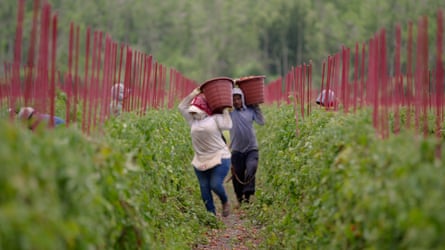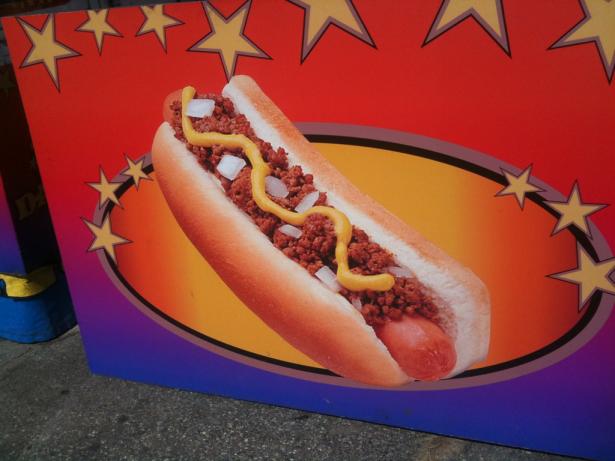In the middle of Food, Inc 2 – the follow-up documentary to 2008’s Food, Inc, narrated by Michael Pollan and Eric Schlosser – scientists share what they have recently discovered about ultra-processed foods (UPFs). They are not just bad for you in a trashy, empty-calories kind of way; they interfere with the brain and the body’s ability to process food; they mess with you on a cellular level. Whole populations are seeing health deteriorate, profoundly, for no purpose beyond profit. It must be annoying, I suggest to Pollan, 69, to hear scientists deliver this as a discovery. He been warning against processed food for decades.
Pollan’s mantra – “Eat food, not too much, mostly plants” – was immortalised in his 2008 book In Defence of Food. By then, he was already an oracle of the genesis, meaning and production of what we eat, thanks to The Botany of Desire (2001) and The Omnivore’s Dilemma (2006). His other memorable phrase from that time was: “Don’t eat anything your great-grandmother wouldn’t recognise as food.”
His cultural impact, in the US and far beyond, was immense. It wasn’t just these nutritional fundamentals, but his entire modus operandi. He would follow a foodstuff from its birth, or germination, to the point where it hit your mouth in the most intricate detail. He took apart Bismarck’s apocryphal line about laws being like sausages. Maybe you do want to see them being made. Maybe, in the long term, you will end up with better sausages.
He has also written about psychedelics, in 2018’s How to Change Your Mind, which in 2022 became a Netflix documentary series that took a wild dive into MDMA, LSD, psilocybin and mescaline. Today, he is a nonfiction professor at Harvard and a science and environmental journalism professor at the University of California, Berkeley. But, above all that, he is Mr Food.
Anyway, back to the question: does it irk him that science took so long to catch up with ultra-processing, grandmothers and so on? “We assume science always gets there first,” he says. “It has such authority. But sometimes the grandmas know things.” He is speaking over a video call from California, looking relaxed and urbane. “I remember being struck, when I was working on nutrition in 2008, by this study that came out saying that the lycopene in tomatoes [often claimed to be an antioxidant] can’t be absorbed by the body unless it comes in the form of fat. OK, so olive oil on tomatoes. There’s a wisdom in that and the grandmas got there first.”
While grandmas, Pollan and Schlosser (the author of 2001’s Fast Food Nation) have been on to junk food since for ever, “that had no scientific meaning”, Pollan says. The gamechanger was Carlos Monteiro, a professor of nutrition at the University of São Paulo, who appears in the new documentary. “He labelled and defined ultra-processed food,” says Pollan. “Processed food you could make at home. An ultra-processed food is one that contains ingredients no normal person has at home and requires equipment you could only find in a factory.”
If UPFs are driving obesity, they are just one part of a giant food pipeline that is completely bust. While Food, Inc 2 is about the US, so many of its elements are true of food systems across … well, for brevity, I would call it “late capitalism”, but Pollan pushes back on that. “Capitalism is a game that can be played according to different rules,” he says. “We can just change the rules.”
Pollan and Schlosser didn’t intend to make a sequel – until Covid. Its effects on the food system were dramatic. “We all had to scrounge for food. Getting into a supermarket was a challenge and then, once you’d got in, there were empty shelves,” says Pollan.
“This is such a weird idea for Americans. We live in abundance. Our supermarkets are cornucopias. We used to look at videos of empty shelves in the Soviet Union and feel self-satisfied. Suddenly, it was happening here. And for very similar reasons: an overly centralised system that didn’t have any redundancy built into it.”
At the same time, in the early days of the virus, pigs were being euthanised in jaw-dropping numbers, because they couldn’t be processed due to lockdowns. Academic papers have been written about the huge psychological toll this took on vets.
But the ripple effects are traumatic for democracy-lovers, too. Tyson Foods, one of the largest meatpacking companies in the US, started a meat-shortage panic with an advert in the New York Times imploring President Trump to invoke the Defense Production Act. “It’s a piece of legislation designed to make companies do things they don’t want to do in the national interest,” Pollan says. “In this case, Tyson wanted to be allowed to do exactly what they wanted, which was to reopen production lines.”
Meatpacking workers were incredibly vulnerable to Covid infection, due to the conditions, and these plants became vectors of infection in surrounding areas. One report in 2020 found that between 3% and 4% of all US Covid deaths were linked to the meatpacking industry.
The US food industry is a story of overconsolidation, usually with four mega-companies dominating 80% or more of every sector, from meat and dairy to cereals and soft drinks. It gives them undue political influence – almost an immunity to legislation. “We keep exempting agriculture from all the laws we have around labour and animal welfare,” Pollan says.
Before Covid, Pollan didn’t think enough had changed in the industry to make it worth another look. But this concentration of power and production was “a new wrinkle”, as was the ultra-processing. “So it was a sad moment – because, as much attention as Eric’s and my books had had, we hadn’t made that much of a dent. The forces arrayed against us were so much stronger than we realised. I think that we were naive about how merely arming the consumer with information would drive change in the food system. It did drive some change, but nowhere near as much as it would take to dislodge power in the food system.”

US agricultural workers in a scene from Food, Inc 2. Photograph: Courtesy of River Road and Participant
He believes in the power of organised consumer boycotts, which are justified by another of the film’s scandals, in which farm workers are so mistreated that their employment amounts to a state of semi-serfdom (you have to watch it for the labourers’ stories – they are staggering). But he is also powerfully aware of state failure. “Policies should be organised around two pillars – one is health of the citizens and the other is health of the environment – and they are not,” he says. “They’re basically designed to lead to overproduction and cheap agricultural commodities, which benefits the soda makers and meat makers.”
There is no doubt that food as it is produced is as harmful to health as tobacco, but there is a question mark over whether that sea change – where cigarette giants were forced to take responsibility for their products – would be possible now, when corporations seem so much more powerful and better defended.
“You realise that it was the tobacco companies, under pressure from the government over smoking, that bought the food industry,” says Pollan. “So it’s a similar playbook, except now they know to burn the internal memos saying: ‘We know this food is unhealthy.’ ‘We know how we can get people to overeat.’ Because the reason they got screwed on tobacco was that there was a paper trail. So they’re not going to make that mistake again.”
‘A system perverted by corporate money’: inside documentary sequel Food, Inc 2
Their other strength now, of course, is that food is too big to fail. When the supply chain of Abbott Laboratories, one of only four significant baby formula manufacturers in the US, was disrupted in 2022 after two shutdowns at its main plant, contributing to a nationwide shortage, the panic in young mothers’ faces as they recounted it to the media was palpable and contagious.
If Pollan comes off as much more optimistic – jaunty, even – in the film than these case studies warrant, it’s because he has a great deal of faith in technology. He is surprisingly enthusiastic about the frontiers of synthesised and cultured meat, given that your great-grandmother would definitely not recognise any of this as food.
In person, though, he is ambivalent about it. “If you can pick off 10% of meat eaters and get them to reduce their consumption, that’s a good thing. But you can’t escape the fact that synthesised meat has 21 ingredients or whatever, some of them never seen before in the human diet. We may look back on this and say: ‘Oh no – we didn’t see this health problem coming.’ But it’s such a non-American idea, precaution. It doesn’t go with the frontier spirit, the heroic individual. It’s so namby-pamby.”
But despite what he has discovered, Pollan still takes enormous pleasure in food: “I just pay more attention to it.” Thank God someone does.
Food, Inc 2 is in UK cinemas and available on demand from Friday, with previews at selected cinemas
Zoe Williams is a Guardian columnist. Twitter @zoesqwilliams
Scroll less and understand more about the subjects you care about with the Guardian's brilliant email newsletters, free to your inbox.



Spread the word